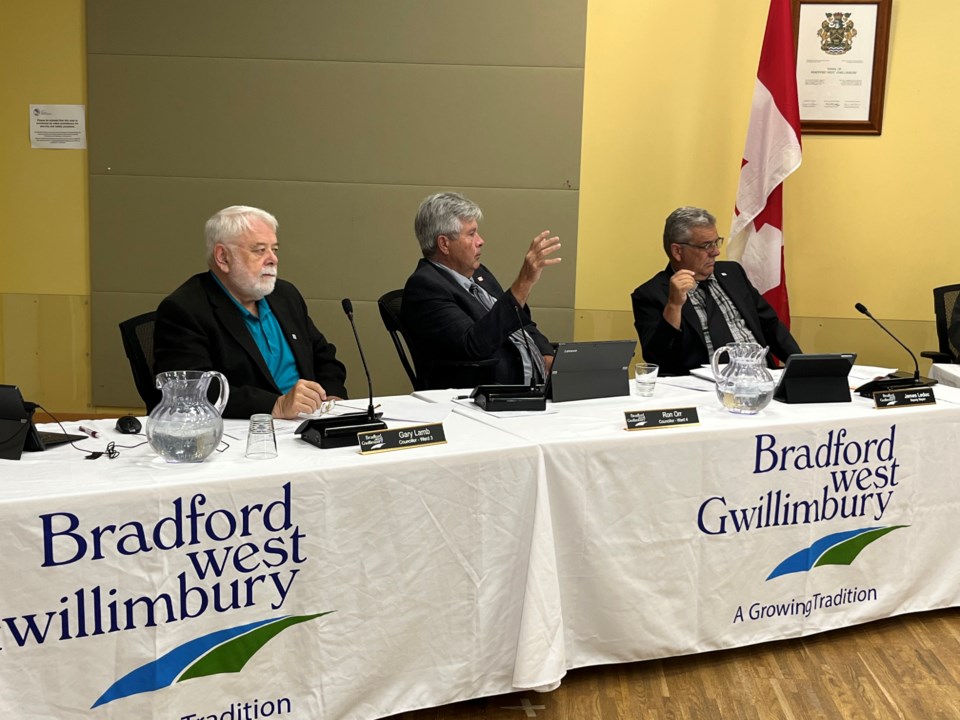Bradford West Gwillimbury councillors got a peak at what changes may need to be made in the wake of Bill 109 and are concerned.
Bill 109 – the More Homes for Everyone Act – received royal assent in April, making changes to several Province of Ontario laws, including the Development Charges Act and the Planning Act, coming into effect between April 2022 and January 2023.
While the changes put some power into the hands of municipalities, by requiring applicants to undergo formal pre-consultation prior to submitting a formal application for site plan approval or provide pertinent information or material where provided in the local Official Plan, the biggest changes benefit the developers, who could see the entirety of their fees refunded to them if an application process drags on.
Effective Jan. 1, 2023, municipalities will have to begin issuing refunds to developers if a decision on a complete site plan is not rendered in 60 days. Half the fees will be refunded between 61 and 90 days, three-quarters refunded by 91 and 120 days and a full refund thereafter.
For zoning bylaw amendment decisions, a similar schedule has been set, albeit with a longer lead time. Municipalities will have 90 days to render a decision, with a 50 per cent refund due between 91 and 150 days, 75 per cent refunded between 151 days and 210 days, with a full refund for any decision arriving after that point.
The refunds “are anticipated to have significant administrative, operational and financial impacts to the town's community planning function, and the potential for significant operational impact on the town's development engineering function,” staff indicated in a report to council at the Aug. 2 meeting.
The changes to the Planning Act will “compromise” the town’s ability to recover 80 per cent of the direct and indirect expenses associated with development applications, staff reported. For 2022, the municipality hoped to recoup approximately $950,000.
The pressure to meet the density requirements outlined by the province, at the speed required to not lose any fees to refund, will be felt greatest by communities such as Bradford West Gwillimbury, argued Coun. Ron Orr.
“I understand that our province (feels) they need this type of building going on, but to put that onto a lot of communities like ourselves, basically, with our proximity to Toronto, we could be asked to double in size,” he said. “If that’s the case, that’s a huge amount of money for our town, and that puts it right on our taxpayer who is here right now…. I’m very concerned with some of the issues that come up in this report.”
Highlighted by staff in both instances are the variables involved in approvals, largely outside of the town’s control, including multiple drafts of submissions of site plan applications, approvals from external agencies and the completion of statutory public meetings which require minimum notice, as outlined through provincial law.
Coun. Raj Sandhu was dismayed to realize that delays from external agencies could end up forcing the municipality to refund money to developers.
“We can lose lots of revenue, lots of fees, based on someone else's actions,” Sandhu said. “We need to have some sort of a mechanism to recover that.”
Council approved staff’s recommendation that reviews of the current Delegation of Approval Authority and Site Plan Control Area bylaws be undertaken, and that recommendations for any changes because of the new regulations be brought back at a later date.
Deputy Mayor James Leduc stressed to staff that whatever happens, council must be the ones making the decisions.
“The buck stops right here at council,” said Leduc. “I want to make sure that in the end when we review these bylaws, that there is some clause that we can turn around… and okay the site plan…. I want some steps in here to make sure that we’re not going to lose any fees or permits because we can’t meet our mandates.”
Another addition in Bill 109 gives developers the right to appeal Official Plans and Municipal Comprehensive Reviews once again. Council was scheduled to discuss modifications to the town’s Official Plan during the Aug. 2 meeting, but the item was deferred in light of the information on Bill 109 and the direction given to staff, as well as additional information on Simcoe County’s Municipal Comprehensive Review.



